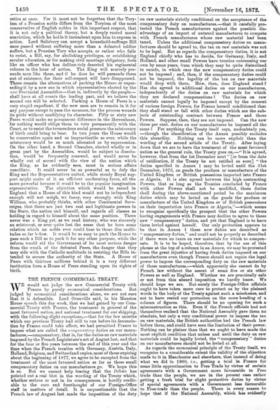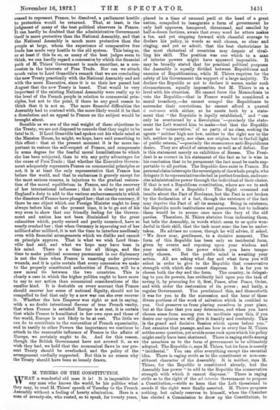THE FRENCH COMMERCIAL TREATY.
WE would not judge the new Commercial Treaty with France by purely economical considerations. But judged by economical considerations alone, we are not sure that it is defensible. Lord Granville said, in his Mansion House speech this day week, that we had gained by our Com- mercial Treaty with France, the treatment in general of the most favoured nation, and national treatment for our shipping, with the following slight exceptions,—that for the few months which our previous Treaty had still to run before its denuncia- tion by France could take effect, we had permitted France to impose what are called the compensatory duties on our menu- factures,—compensatory, that is, for the duties on raw materials imposed by the French Legislature's act of August last, and that for the four or five years between the end of this year and the time when the French treaties with Germany, Austria, Italy, Holland, Belgium, andSvritzerlancl expire, most of these expiring about the beginning of 1877, we agree to be excepted from the treatment of the most favoured nation as far as these small compensatory duties on our manufactures go. We hope this is so. But we cannot help fearing that the De'beas has pointed out a real blot in the wording of the Treaty which, whether serious or not in its consequences, is hardly credit- able to the care and forethought of our Foreign-Office staff in matters of detail. It is unquestionable that the French law of August last made the imposition of the duty
on raw materials strictly conditional on the acceptance of the compensatory duty on manufactures,—that it carefully pro- tected the French manufacturers against the possible dis- advantage of an import of untaxed manufactures to compete with French manufactures whose raw material had been taxed. Unless the additional compensatory duties on manu- factures should be agreed to, the tax on raw materials was not to be legal. But as regards the compensatory duties, ibis not England chiefly who has to decide, for Germany, Italy, and Holland, and other small Powers have treaties outrunning our own by some years, From which they may be quite disinclined to recede, in which case the new compensatory duties could not be imposed ; and, then, if the compensatory duties could not be imposed, the legality of the tax on raw materials would drop with them. How, then, does England stand ? Has she agreed to additional duties on our manufactures, independently of the duties on raw materials for which they are declared compensations ? The duties on raw materials cannot legally be imposed except by the consent of various foreign Powers, for France herself conditioned that they shall stand or fall with other duties which are the sub- jects of outstanding contract between France and those Powers. Suppose, then, they are not imposed. Can the new three per cent. duties on our manufactures be imposed all the same ? For anything the Treaty itself says, nndoubtedy yes, —though the classification of the Annex possibly excludes this absurdity. Nothing can be more explicit than the wording of the second article of the Treaty. After laying down that we are to have the treatment of the most favoured nation as the general rule, the Treaty goes on,—" Itis agreed, however, that from the 1st December next" [or from the date of ratification, if the Treaty be not ratified so soon] "the duties specified in Annex 1 may be levied until the 31st December, 1876, on goods the produce or manufacture of the United Kingdom or British possessions imported into France or Algeria. It is also agreed between the high contracting Powers, that as long as the Treaties concluded by France with other Powers shall not be modified, these duties shall during the above-mentioned period be the maximum duties which may be levied on the goods the produce or manufacture of the United Kingdom or of British possessions on their importation into France or Algeria,"—which seems to recognise specifically the prospect that the other Powers having engagements with France may decline to agree to these new "compensatory" duties, and yet that England is to have them levied against herself. Our only protection appears to be that in Annex 1 these new duties are described as "compensatory duties," and could not be properly so described if there were no taxes on raw materials for which to compen- sate. It is to be hoped, therefore, that by the use of this phrase at the top of a column in an Annex, we may be protected from the great injustice of having fresh duties imposed on our manufactures even though France should not regain the legal power to impose the corresponding duty on the raw materials of these manufactures,—which apparently she cannot do by French law without the assent of some five or six other Powers as well as England. Whether we are practically safe or not from this absurd imposition we hardly know. We should hope we are. But surely the Foreign-Office officials ought to have taken more care to protect us by the plainest words in the body of the Treaty against such a mischance, and not to have rested our protection on the mere heading of a column of figures. There should be no opening for such a misconstruction as this. Even if the French officials had not themselves realised that the National Assembly gave them no absolute, but only a very conditional power to impose the tax on raw materials, the British authorities had the French law before them, and could have seen the limitation of their power. Nothing can be plainer than that we ought to have made the most explicit condition that unless and until the duty on raw materials could be legally levied, the "compensatory " duties on our manufactures should not be levied at all.
As regards the economical principle of the Treaty itself, we recognise to a considerable extent the validity of the objection made to it in Manchester and elsewhere, that instead of doing what we did in 1860, i.e., getting a trial in France for some little approximation to Free Trade by virtue of certain agreements with a Government more favourable to Free trade than the people, we are in the present case rather getting a fresh trial for slight protective duties by virtue of special agreements with a Government less favourable to Free-trade than the people. There is every reason to hope that if the National Assembly, which has evidently ceased to represent France, be dissolved, a parliament hostile to protection would be returned. That, at least, is the judgment of many of the beat political observers in France. It can hardly be doubted that the administrative Government itself is more protective than the National Assembly, and that the National Assembly is much more protective than the people at large, whom the experience of comparative free trade has made very hostile to the old system. This being so, or at least if this be so, as many of the best judges seem to think, we can hardly regard a concession by which the financial path of M. Thiers' Government is made smoother, as a con- cession in the interests of Free Trade. Nor can we attach much value to Lord Granville's remark that we are concluding the new Treaty practically with the National Assembly and not with the mere Executive, since it is on their law passed last August that the new Treaty is based. That would be very important if the existing National Assembly were really up to the level of the French people in relation to commercial prin- ciples, but not to the point, if there be any good reason to think that it is not so. The more financial difficulties the Assembly had to contend with, the more likely would it be that a dissolution and an appeal to France on the subject would be brought about.
Sensible as we are of the real weight of these objections to the Treaty, we are not disposed to concede that they ought to be fatal to it. If Lord Granville had spoken out his whole mind at the Mansion House, he might, we hope, have said something to this effect : that at the present moment it is far more im- portant to restore the self-respect of France, and compensate in some degree for the fearful moral humiliations to which she has been subjected, than to win any petty advantages for the cause of Free Trade ; that whether the Executive Govern- ment adequately represents France on commercial principles or not, it is at least the only representative that France has before the world, and that to embarrass it gravely except for the most serious reasons, is injurious to the gradual restora- tion of the moral equilibrium in France, and to the recovery of her international influence ; that it is clearly no part of England's duty to add to the various embarrassments in which the disasters of France have plunged her; that on the contrary, if there be one object which our Foreign Minister ought to keep always before him at the present time, it is to go out of his way even to show that our friendly feeling for the Govern- ment and nation has not been diminished by the great calamities which, partly earned and partly unearned, have so nearly crushed her ; that when Germany is squeezing out of her milliard after milliard, it is not the time to interfere needlessly even with financial arrangements which we dislike and cannot on principle approve. That is what we wish Lord Gran- ville had said, and what we hope may have been in his mind. There is a time for all things, and the time to make political economy paramount in our diplomacy is not the time when France is smarting under grievous wounds, and it is quite certain that every concession we make to the properly constituted authorities of France, will be a new moral tie between the two countries. This is clearly a case in which the higher politics ought to have more to say to our action than economical considerations of the smaller kind. It is desirable on every account that France should recover her sense of national dignity, should not be compelled to feel that only by a new war can she ever recover it. Whether the late Emperor was right or not in saying, with a no doubt intentional flavour of true French vanity, that when France is satisfied Europe is at rest, it is certain that while France is humiliated in her own eyes and those of the world, Europe is not likely to be at rest. The little we can do to contribute to the restoration of French equanimity, and to testify to other Powers the importance we continue to attach to the reasonable influence of France in the affairs of Europe, we certainly ought to do. And for this reason, though the British Government have not avowed it, as we wish they had, we hold that the economical flaws in our pre- sent Treaty should be overlooked, and the policy of the arrangement cordially supported. But this is no reason why the Treaty should have been so loosely drawn.



































 Previous page
Previous page